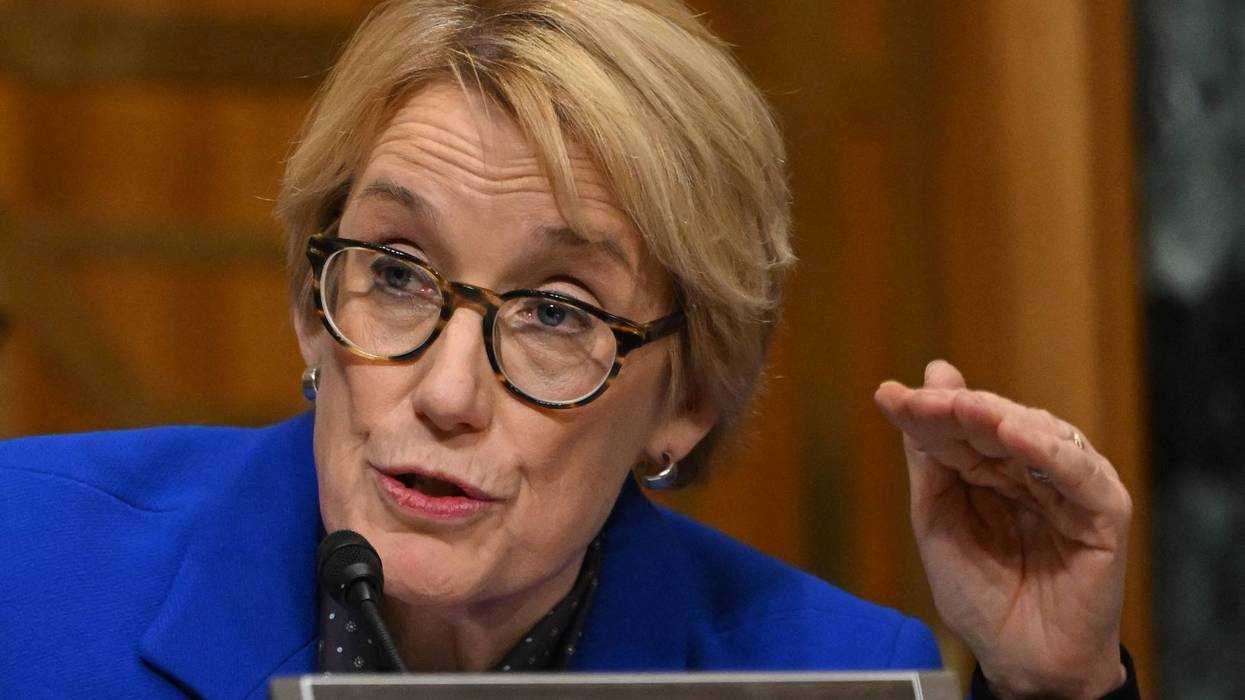April, 30 2019, 12:00am EDT

For Immediate Release
Contact:
Andy Gheorghiu, Policy Advisor & Campaigner, Food & Water Europe, agheorghiu@fweurope.org, +49 160 20 30 974
Scott Edwards, Legal Director, Food & Water Watch, sedwards@fwwatch.org, +1 202.683.4969
On Eve of EU-US Energy Forum, 200 Groups on Both Sides of the Atlantic Unite in Opposition To Climate-hostile LNG Trade
WASHINGTON/BRUSSELS
Today, 200 groups from both sides of the Atlantic released an open letter to EU Commissioner Miguel Arias Canete and U.S. Energy Secretary Rick Perry, calling on the EU and U.S. administrations to immediately stop the transatlantic trade in fracked hydrocarbons.
Yesterday, the Department of Energy announced that Secretary Perry would be attending the EU-US Energy Council High-Level Forum in Brussels on May 2 - paving the way for a new Trans-Atlantic Trade Agreement with imports and exports of U.S. fracked gas at the heart of the deal. According to data released in early March, EU imports of liquefied natural gas (LNG) from the U.S. have increased by 181% since July 2018.
The letter highlights that the continued use and import/export of fracked LNG torpedoes critical climate targets and violates basic human rights. In 2012, the UN Environment Programme (UNEP) issued a "Global Alert" on fracking, concluding that fracking may have environmental impacts even if done properly.
"The LNG trade is paving the way for prolonged use of fossil fuels and plastics, creating a twin environmental and human rights emergency," said Wenonah Hauter, Executive Director of Food & Water Watch and Food & Water Europe. "Governments on both sides of the Atlantic are failing to do what it takes to stand up to fracked gas interests and prevent looming climate chaos."
The signatories state that new gas infrastructure has a significant economic lifespan (usually between 30 and 50 years) that goes beyond the point when we must fully decarbonize our energy systems. Ongoing use of fossil fuels like gas would also have devastating economic impacts on both sides of the Atlantic.
The letter also refers to what activist call the #Fracking4Plastics link, highlighting that the plastics industry has reaped under-the-radar benefits from the environmentally destructive fracking boom and an oversupply of cheap ethane. This surge has been a boon for the plastics industry, which relies on petrochemical manufacturing to turn ethane, a hydrocarbon present in natural gas, into plastics.
Beginning in 2012, chemical companies started aggressively investing in petrochemical plants and export facilities focused on tapping the ethane glut, creating further negative implications for human and environmental rights.
"The EU is importing U.S. fracked gas to create plastics," says Andy Gheorghiu, policy advisor at Food & Water Europe. "Europe is throwing away a stable climate for a throw-away society."
Signatories include Food & Water Watch, Food & Water Europe, Friends of the Earth U.S. and EU, Greenpeace, Break Free From Plastic, European Environmental Bureau, Oil Change International, Rainforest Action Network, Talk Fracking, Health and Environment Justice Support International, Earthworks, 350, Corporate Europe Observatory, Rethink Plastic, Ocean Conservation Research, Frack Free United, Berks Gas Truth, SEE Change Network and Safety Before LNG.
Food & Water Watch mobilizes regular people to build political power to move bold and uncompromised solutions to the most pressing food, water, and climate problems of our time. We work to protect people's health, communities, and democracy from the growing destructive power of the most powerful economic interests.
(202) 683-2500LATEST NEWS
'One Family Is About to Control CBS, CNN, HBO, and TikTok': Alarm Grows Over Paramount-Warner Bros. Merger
"When Democrats win back power we are going to break up these anti-democratic information conglomerates," said Sen. Chris Murphy. "All of them."
Feb 27, 2026
Concerns are mounting about the state of the US media landscape now that it looks increasingly likely that Paramount Skydance—a company controlled by the son of billionaire Larry Ellison, a donor to President Donald Trump—will succeed in its bid to acquire Warner Bros. Discovery.
One day after Netflix announced that it was dropping its previously accepted bid to buy Warner, many critics demanded that antitrust laws be invoked to block the Paramount-Warner merger from going through.
Alvaro Bedoya, former commissioner at the Federal Trade Commission, warned that the Ellison family could soon use their control over vast swaths of US media properties to engage in mass censorship, and he pointed to their decisions to cancel Stephen Colbert's program and to refuse to air an interview with Democratic US Senate candidate James Talarico.
"One family is about to control CBS, CNN, HBO, and TikTok," he wrote in a social media post. "They’ll buy [Warner Bros. Discovery] with $24 billion in money from the Saudis, Qatar, and Abu Dhabi. To win over Trump, they canceled Colbert... and blocked Talarico. Much more will follow. Block this rotten deal."
Craig Aaron, co-CEO of Free Press, said the proposed Paramount-Warner merger was "even worse" than the proposed Netflix-Warner merger.
"This deal endangers our democracy by giving a family of pliant billionaires even more control of vast swaths of our news coverage, TV stations, and movie studios," Aaron said. "Allowing more mergers in the already highly concentrated movie business will harm filmmakers and industry workers when Paramount delivers on its promise to make deep cuts to please its Wall Street backers."
Writing in the American Prospect, David Dayen described the Paramount-Warner merger as the "worst-case scenario" that has "echoes of media-political consolidation as we see in dictatorships the world over."
Dayen argued that state governments still had time to block the merger, but warned that they were in a race against time given that Paramount's consultants "are trying to speed run the deal in a matter of weeks."
"The states could challenge the merger even after the feds bless it," Dayen continued, "but by then, Paramount and Warner Bros. would have likely commingled their assets, engaged in layoffs, and made it very difficult to untangle the merger, particularly for judges who are inherently conservative on these matters."
Some Democratic lawmakers are warning that they aren't going to stop fighting the Paramount-Warner merger even if it goes through.
In an interview with Semafor, Sen. Ruben Gallego (R-Ariz.) predicted that the Ellisons would come to regret aggressively buying up US media properties.
"Once we take power, whoever the president is, we’re going to break up your companies," said Gallego. "So all the investment you did to create these mergers are going to be for naught. Your investors are going to be pissed at you, and you’re likely going to end up getting fired as the CEO because you wasted so much money and corrupted yourself in the process."
Sen. Chris Murphy (D-Conn.) echoed Gallego's argument in a social media post.
"Paramount should enjoy its growing news monopoly while they have it," he wrote, "because when Democrats win back power we are going to break up these anti-democratic information conglomerates. All of them."
Keep ReadingShow Less
Transgender Kansas Residents Sue Over State's Invalidation of Driver's Licenses
"SB 244 is a transparent attempt to deny transgender people autonomy over their own identities and push them out of public life altogether.”
Feb 27, 2026
Accusing Kansas Republican lawmakers of violating the state's Constitution and waging "a direct attack on the dignity and humanity of transgender Kansans" by passing a law that invalidates their driver's licenses, the ACLU on Friday filed a lawsuit on behalf of two transgender residents and called on a state judge to block the statute.
The organization took legal action a day after SB 244 went into effect, rendering the birth certificates and driver's licenses of about 1,700 Kansans invalid because they have been changed to reflect the gender identity of the people they were issued to, rather than their sex assigned at birth.
Transgender Kansans across the state received letters this week from the Kansas Department of Revenue instructing them to "surrender [their] current credential" and exchange it for one that matches their sex assigned at birth.
“Your current credential will be invalid immediately,’’ warns the letter, adding that driving without a valid license could result in penalties.
SB 244 also prohibits transgender Kansans from updating the gender marker on state-issued birth certificates and driver's licenses in the future, prohibits transgender people from using public restrooms that match their identity on government property, and allows anyone who suspects a transgender person is in violation of the law to sue the individual for damages of up to $1,000.
The bathroom provisions were added to SB 244 without a hearing or any public comment.
The state's Democratic governor, Laura Kelly, vetoed the legislation, but Republican legislators overrode her veto.
"A confident republic does not need to erase people to prove a point. It can hold together across deep differences without turning paperwork into a weapon."
Harper Seldin, a senior staff attorney for the ACLU's LGBTQ and HIV Rights Project, called the law "a cruel and craven threat to public safety all in the name of fostering fear, division, and paranoia."
“The invalidation of state-issued IDs threatens to out transgender people against their will every time they apply for a job, rent an apartment, or interact with police," said Seldin. "Taken as a whole, SB 244 is a transparent attempt to deny transgender people autonomy over their own identities and push them out of public life altogether.”
States including Texas, Florida, and Tennessee have laws requiring the gender marker on a person's driver's license to match their sex assigned at birth, but Kansas is the first state to invalidate the licenses of people who have changed the gender markers.
The law was passed as President Donald Trump and Republican lawmakers denounce what they view as radical "gender ideology," including science-backed findings that a person's gender can be fluid and that gender-affirming healthcare can reduce depression and suicidal ideation.
In 2025, the ACLU tracked more than 600 anti-LGBTQ laws and proposals in states. At least 74 were passed into law.
In the lawsuit filed in the District Court of Douglas County, two anonymous plaintiffs identified as Daniel Doe and Matthew Moe argue that SB 244 violates the Kansas Constitution's guarantees of personal autonomy, privacy, equality under the law, due process, and freedom of speech.
They argue that the law is discriminatory and violates equal protection laws because other Kansans are free to change their name or choose whether or not to list other aspects of their identity, such disclosing veteran status or a disability, on their licenses.
One critic calledlled SB 244 "humiliation with a state seal."
"This does not make anyone safer on the road. It just forces people to carry documents that lie about who they are, and then punishes them when those lies put them at risk at traffic stops, pharmacies, airports," the social media user said. "A confident republic does not need to erase people to prove a point. It can hold together across deep differences without turning paperwork into a weapon."
Heather St. Clair, a lawyer with Ballard Spahr, a law firm helping to represent the plaintiffs, said the law amounts to "state-sanctioned attack on transgender people aimed at silencing, dehumanizing, and alienating Kansans whose gender identity does not conform to the state Legislature’s preferences."
Ballard Spahr, she said, "is dedicated to protecting the constitutional rights jeopardized by this new law.”
The plaintiffs are seeking a temporary restraining order and a temporary injunction to block the law from entering into force while the case is being decided.
The advocacy group Southern Equality applauded the legal challenge.
"We are grateful to the ACLU for filing a lawsuit against this heinous law in defense of trans Kansans," said Southern Equality. "We join in solidarity with trans people everywhere: You belong in public spaces, and we will not stand by while your rights are stripped away."
Keep ReadingShow Less
Congress Finds 4 Data Breaches Cost Public $20 Billion, Fueling Calls for Action to 'Protect Americans From Scams'
"As international criminal syndicates increasingly use scams to target Americans, data brokers shouldn’t make it harder for people to protect themselves," said the Joint Economic Committee's ranking member.
Feb 27, 2026
Just four major data broker breaches in recent years have cost US consumers over $20 billion, according to a Thursday report from a key leader in Congress that argues "additional action is needed to protect Americans from scams."
Sen. Maggie Hassan (D-NH), ranking member of the congressional Joint Economic Committee (JEC), launched a sweeping investigation into financial scams last July. As part of it, she's examined data brokers, which collect and sell individuals' personal information. These companies often operate with limited transparency, her report explains, making it "more difficult for individuals to secure their information online and, ultimately, protect themselves from the growing threat of scams."
"Data brokers, for example, can enable scams by making consumers' personal information available to bad actors, who can then use details like Social Security numbers, home addresses, or banking information to develop customized and convincing scams," the report explains. "In some cases, data brokers have allegedly sold this information directly to scammers; in others, cyber hacks of data brokers have exposed individuals' data to uncontrolled circulation online."
Last August, after Wired reported that some data brokers took steps to hide their opt-out pages, Hassan issued investigative requests to Comscore, Findem, IQVIA Digital, Telesign, and 6Sense Insights. The report states that all of the companies but Findem responded with "actions to make their opt-out options more accessible to consumers and other parties," which "included removing 'no index' code that had blocked opt-out pages from search engine results, adding opt-out links in more prominent locations, and publishing blog content explaining how people can exercise their privacy rights."
"Notably," the report continues, "Findem did not respond to the ranking member's requests or written outreach from committee staff and has not removed the 'no index' code from its opt-out page—raising serious concerns about its responsiveness to opt-out requests and commitment to data privacy."
While recognizing the other companies for their positive responses, Hassan's report also stresses that more must be done. For instance, she requested information about efforts "to audit or assess the visibility of opt-out options or the success rates of opt-out requests," and "only 6sense stated that it contracts with third-party auditors to conduct both of these assessments."
Highlighting the need for further action, Hassan's staff estimated that identity theft stemming from four large data broker breaches—Equifax in 2017, impacting 147 million US residents; Exactis in 2018, impacting 230 million; National Public in 2023, impacting 270 million; and TransUnion in 2025, impacting 4.4 million—cost American consumers $20.9 billion.
"As international criminal syndicates increasingly use scams to target Americans, data brokers shouldn't make it harder for people to protect themselves," Hassan said in a statement. "This report shows the scope of the threat that people face from data broker breaches and underscores the importance of protecting Americans' private data."
She added that "it is encouraging that after we launched our investigation, many companies took steps to improve opt-out options for Americans, which in turn can help more consumers keep their information out of the wrong hands."
As a related webpage from the Electronic Privacy Information Center details: "There is no federal law in the United States that adequately regulates the data broker industry. As a result, private companies invade our private lives, spy on our families, and gather our most intimate facts, on a mass scale, for profit. EPIC supports state and federal legislative efforts that set limits on data brokers’ collection, use, retention, and disclosure of personal data."
In recent years, members of Congress have introduced various legislative proposals aimed at reining in data brokers—including in the Security and Freedom Enhancement (SAFE) Act, introduced on Monday. The bipartisan bill would, among other things, close the so-called "data broker loophole" that, as Sens. Dick Durbin (D-Ill.) and Mike Lee (R-Utah) put it, "intelligence and law enforcement agencies use to buy their way around the Fourth Amendment" to the US Constitution.
There are some limits that have passed, including in Protecting Americans’ Data from Foreign Adversaries Act of 2024. Earlier this month, the Federal Trade Commission sent letters reminding 13 companies of their obligations to comply with the PADFAA, which "prohibits data brokers from selling, licensing, renting, trading, transferring, releasing, disclosing, providing access to, or otherwise making available personally identifiable sensitive data of a United States individual to any foreign adversary country or any entity that is controlled by a foreign adversary."
However, as Lartease Tiffith, an expert at American and George Mason universities, laid out in an article for Just Security last November, while Congress enacted the PADFAA "with the right goal," the law, as written, "could penalize legitimate US companies for routine global operations while failing to deliver the targeted national security tool Congress intended."
Keep ReadingShow Less
Most Popular


